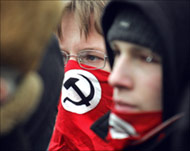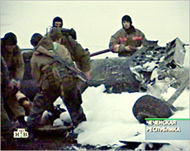Putin pledges democratic future
Russian President Vladimir Putin has said deeper development of democracy, rule of law and human rights are the country’s top priorities for the years ahead.

But objectives should be pursued while simultaneously protecting Russia’s own national identity, he said.
“The main political-ideological task is the development of Russia as a free, democratic country,” Putin said in his annual state of the nation address before a joint session of parliament, broadcast live on state television.
Strengthening of democratic institutions, protection of human rights and freedoms and encouragement of civil society were needed in Russia as bedrock principles both of social organisation and economic development and anyone who believed otherwise was mistaken, Putin said.
Disintegration spectre
The 52-year-old Russian leader described the 1991 break-up of the Soviet Union as “the biggest geopolitical catastrophe” of the 20th century, and cautioned that the same trends that produced that disintegration were today tugging at Russia itself and needed to be countered.
Russia must pursue democratic development and simultaneously “protect its own values, hold on to its heritage, find its own road to democracy”, Putin said in the 45-minute speech.
 |
|
Putin: Soviet Union’s break-up |
Putin, making his second state of the nation address since his landslide re-election in March 2004, sought to counter concerns abroad that Russia was becoming increasingly authoritarian under his leadership, saying media needed to be free and the judiciary independent for Russia to prosper.
“We must ensure access to the media for all parliamentary factions,” Putin said, adding that new measures to encourage the principle of free speech in media were needed and “will improve the quality and objectivity of the information our society is receiving”.
Putin also called for a range of new measures on the economic front aimed at building confidence both among foreign investors and with Russians who hide money in the country or take it abroad.
Limits to privatisation
The Russian leader criticised the government for failing to deliver more quickly on promises to shorten the statute of limitations for review of controversial 1990s privatisations of state enterprises from the current 10 years to three years.
|
“It is time for us to clearly establish the areas of the economy where the interests of independence and Russian security dictate the need for predominant control by national, including state, capital” Russian President Vladimir Putin |
“The relevant proposals on amending laws have already been submitted to the government. Unfortunately, we’ve heard nothing, yet just one word in one article needs adjustment,” Putin said.
He also suggested introducing a new flat 13% tax on declared capital, a proposal aimed at stemming the tide of capital flight and encouraging residents to legalise their money in a simple and affordable way without fear of reprisal from the state.
“This money must work for the good of our economy, of our country, and not lie in offshore accounts,” he said.
Chechen elections
At the same time however, Putin made clear that restrictions on foreign ownership of Russian enterprises considered to be of national strategic importance should remain in place, albeit with greater clarification.
“It is time for us to clearly establish the areas of the economy where the interests of independence and Russian security dictate the need for predominant control by national, including state, capital,” Putin said.
 |
|
Russian death toll continues to |
Turning to the security situation in the North Caucasus, the Russian president said he believed the forthcoming parliamentary elections in the shattered republic of Chechnya would form a “core of stability and democracy” in the region.
Russian troops are well into their fifth year of fighting their second war in the past decade in Chechnya, where armed rebels are fighting to separate from Russia altogether. The death toll on both sides continues to rise virtually daily, though this receives little media attention in Moscow.
Putin said Russia, which was shaken by a string of major attacks late last summer, had made important gains on security but was till vulnerable to such violence.
“There must not be any illusions here,” he said. “The threat is
still very strong.”